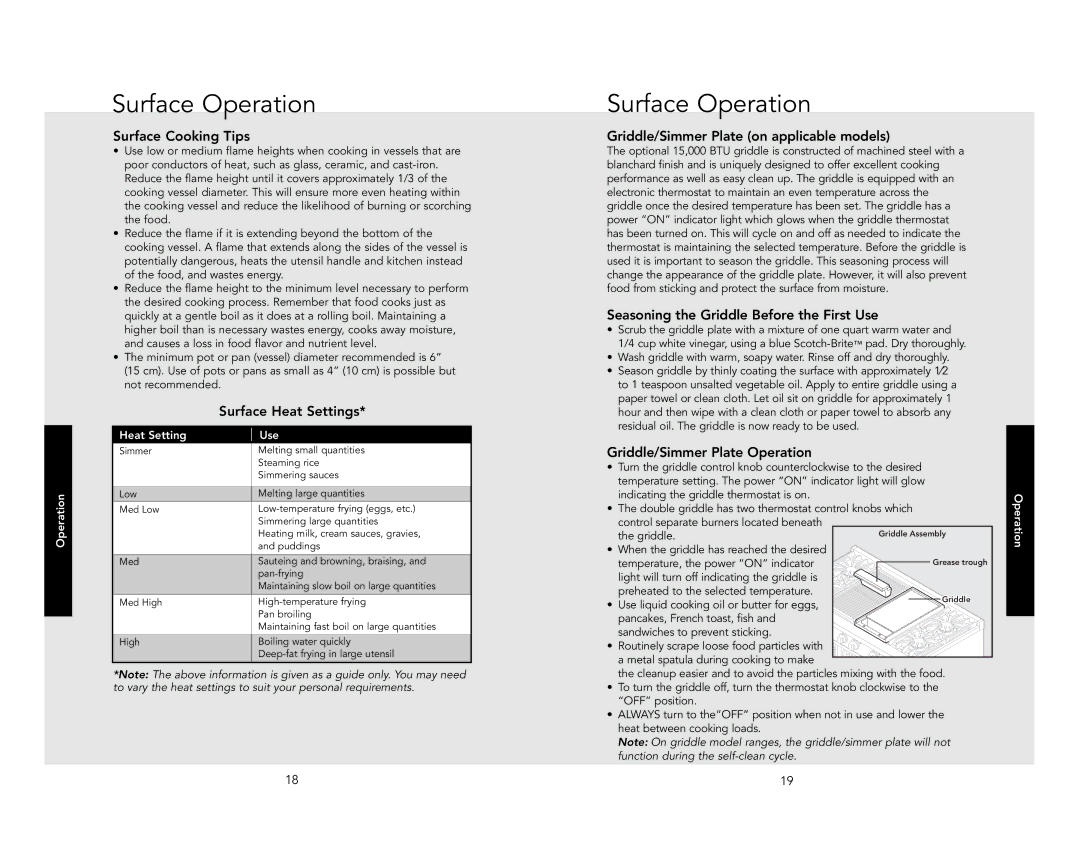
Surface Operation
Surface Cooking Tips
•Use low or medium flame heights when cooking in vessels that are poor conductors of heat, such as glass, ceramic, and
•Reduce the flame if it is extending beyond the bottom of the cooking vessel. A flame that extends along the sides of the vessel is potentially dangerous, heats the utensil handle and kitchen instead of the food, and wastes energy.
•Reduce the flame height to the minimum level necessary to perform the desired cooking process. Remember that food cooks just as quickly at a gentle boil as it does at a rolling boil. Maintaining a higher boil than is necessary wastes energy, cooks away moisture, and causes a loss in food flavor and nutrient level.
•The minimum pot or pan (vessel) diameter recommended is 6” (15 cm). Use of pots or pans as small as 4” (10 cm) is possible but not recommended.
|
| Surface Heat Settings* | |
|
|
|
|
| Heat Setting |
| Use |
| Simmer |
| Melting small quantities |
|
|
| Steaming rice |
|
|
| Simmering sauces |
|
|
|
|
Operation | Low |
| Melting large quantities |
Med Low |
| ||
|
| ||
|
|
| Simmering large quantities |
|
|
| Heating milk, cream sauces, gravies, |
|
|
| and puddings |
|
|
|
|
| Med |
| Sauteing and browning, braising, and |
|
|
| |
|
|
| Maintaining slow boil on large quantities |
| Med High |
| |
|
|
| Pan broiling |
|
|
| Maintaining fast boil on large quantities |
|
|
|
|
| High |
| Boiling water quickly |
|
|
| |
*Note: The above information is given as a guide only. You may need to vary the heat settings to suit your personal requirements.
Surface Operation
Griddle/Simmer Plate (on applicable models)
The optional 15,000 BTU griddle is constructed of machined steel with a blanchard finish and is uniquely designed to offer excellent cooking performance as well as easy clean up. The griddle is equipped with an electronic thermostat to maintain an even temperature across the griddle once the desired temperature has been set. The griddle has a power “ON” indicator light which glows when the griddle thermostat has been turned on. This will cycle on and off as needed to indicate the thermostat is maintaining the selected temperature. Before the griddle is used it is important to season the griddle. This seasoning process will change the appearance of the griddle plate. However, it will also prevent food from sticking and protect the surface from moisture.
Seasoning the Griddle Before the First Use
•Scrub the griddle plate with a mixture of one quart warm water and 1/4 cup white vinegar, using a blue
•Wash griddle with warm, soapy water. Rinse off and dry thoroughly.
•Season griddle by thinly coating the surface with approximately 1⁄2 to 1 teaspoon unsalted vegetable oil. Apply to entire griddle using a paper towel or clean cloth. Let oil sit on griddle for approximately 1 hour and then wipe with a clean cloth or paper towel to absorb any residual oil. The griddle is now ready to be used.
Griddle/Simmer Plate Operation
•Turn the griddle control knob counterclockwise to the desired temperature setting. The power “ON” indicator light will glow indicating the griddle thermostat is on.
•The double griddle has two thermostat control knobs which control separate burners located beneath
the griddle.
• When the griddle has reached the desired temperature, the power “ON” indicator light will turn off indicating the griddle is preheated to the selected temperature.
• Use liquid cooking oil or butter for eggs, pancakes, French toast, fish and
sandwiches to prevent sticking.
• Routinely scrape loose food particles with
a metal spatula during cooking to make
the cleanup easier and to avoid the particles mixing with the food.
•To turn the griddle off, turn the thermostat knob clockwise to the “OFF” position.
•ALWAYS turn to the“OFF” position when not in use and lower the heat between cooking loads.
Note: On griddle model ranges, the griddle/simmer plate will not function during the
Operation
18 | 19 |
